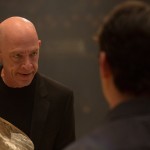 In his new book, Aloof:Figuring Out Life with a God Who Hides (Thomas Nelson), Tony Kriz writes with vulnerable honesty about his experience of God. It is an experience marked by long dry periods, no audible voice of God, and yet some hints of the divine presence.
In his new book, Aloof:Figuring Out Life with a God Who Hides (Thomas Nelson), Tony Kriz writes with vulnerable honesty about his experience of God. It is an experience marked by long dry periods, no audible voice of God, and yet some hints of the divine presence.
Aloof is first and foremost narrative nonfiction, the literary spiritual memoir. Its artful tangling with the realities of the life of faith reminded me a bit of Donald Miller’s genre-changing Blue Like Jazz. It’s sad but true that it’s hard to find really good narratives of the experience of faith in God that manage to avoid a facade of certainty. We want to experience God and paint that experience with absolute certainty. As I read, I thought about how much of our American Christianity is infused with an emotional imperative. We often actually believe that if we sometimes don’t feel God’s presence or hear His voice that it means our faith isn’t true or that we have failed or that God has forsaken us.
Kriz writes of his desire to find the right formula to try to “get God to notice me.” He writes of the desperate attempt to discover the “magic” that would unlock the immediacy of a relationship with God, only to find himself disappointed. He writes of being bitterly disappointed by the ineffective results of his own efforts and by the clay feet of his spiritual heroes. Where is God? Why does He hide? The entire book grapples with these questions and provides thoughtful, rich insights about why God might be hiding from us.
I can remember being a teenager, desperate for the certain presence of God in such a way that I was willing to try almost anything to get it. I remember sitting in Pentecostal church services, surrounded by people “speaking in tongues” and people “getting up and prophesying.” And I can remember the longing and the apprehension that God would speak to and through me like that too. I was desperate for His touch, but also afraid of it.
I have had times I truly believed I was “called” to something, only to look back and wonder whether I was convincing myself of what I wanted to do anyway. In this, I truly resonated with Kriz’s story about believing he was called to Albania to do full-time missions, only to crash and burn in a colossal failure. He came to conclude that he had convinced himself that God was commanding what Kriz wanted to do anyway. He didn’t really want to go to Albania for love of God. He wanted to go in order to impress God and get His attention. But God is not thwarted by our sinful motivations:
Does my insidiousness hinder God’s leading? Do I have that much power?….Now, as I prayerfully reflect on my past, I think I have come full circle and believe God was actually present in that circumstance. I believe that there was work that God needed to do in me. He was fully committed to that work, and that work may have required my chaos to fully run its course. Maybe God is just the sort of Being to lead us through our pathologies just as effectively as through “godly” things like the Bible (147).
I have seen the truth of this insight in my own life. Sometimes I have pushed ahead, telling myself God was calling me to do something. And it may well be that the thing I wanted to do was nothing really evil. But perhaps I was doing it for the wrong reason, to fill up something that was lacking in me. And maybe, just maybe, God said, “Ok, Rebecca. You can go do this thing. I will use it anyway.” I don’t know for sure, but looking back, I see times when that seems to have happened. Times when God let my crazy, my brokenness, my unhealed hurts run their course so that He could bring me yet another level of healing.
In his book, Kriz is repeatedly careful to honor the mystery of our encounters with God. There are many stories he tells where he suggests where God may have been active, but he’s humble enough to acknowledge his bias and to admit it’s possible some of these experiences were just coincidences (although there are certainly some where he’s just about convinced it really was God). He presents these stories humbly for our evaluation. This narrative technique helps the book be accessible both to Christians and to those who don’t believe in God. It’s not a sermon; it’s a story. And Kriz’s insights about why it might be that we experience God hiding from us are among the richest insights on this topic I’ve ever read. My underlined and dog-eared pages are proof that I will be returning to this book again.
What really caught my attention as the book moved to its conclusion was the way that Kriz turned around the image of God hiding from us. By this I mean that his writing subverts the hiddenness of God by pointing to the revealed God in Jesus Christ. God is hidden in Jesus in the sense that this God has sunk down so deep into our flesh and bone as to be one with His creation.
God hides from me in the stories of a Divine King who touched lepers,
loved the poor,
befriended sinners,
told stories,
instructed to love,
honored strangers,
embraced the marginalized,
pitched tables,
kneeled with basin and towel,
served bread and wine,
received spittle and spear,
said, “Lord, forgive them…”
gave up breath,
loves on… (220-21).
This is so very close to Luther’s teaching on the Hidden God and the Revealed God. Luther acknowledged that there are many difficult things to understand about God. In the Old Testament, we read of so much judgment. We experience tragedy and sorrow and loss and evil in our lives too. When we see such things as the death of a child (Kriz’s little nephew’s battle with cancer is central to his narrative arc and to his wrestling with questions of theodicy) or famine or rampant disease or oppression or terrorism, we as people of faith struggle so deeply. How can God allow these things to happen and not stop them? We run head-first into the Hiddenness of God. We run head-first into the things of God we just cannot understand.
Luther’s answer to this was to acknowledge that we probably won’t find all of the answers to these dark questions in this lifetime. We might discover some of them, and it doesn’t hurt to try, but there are always going to be things about God that we just don’t understand. So rather than make ourselves crazy trying to sort out why God would allow such things, Luther pointed to the Revealed God found in Jesus Christ. He suggested that in those times when God just doesn’t make sense, we should look at the cross (and I would add the incarnation itself to the cross as well). We look at Jesus’s coming to be with us, and in that we are able to see God’s heart toward us. The cross is not, as some might charge, divine child abuse. Jesus is the Son of God, yes, but He is also God. The Trinity is one God in three persons. God Himself is on that cross. He loved us enough to come near to us in our brokenness and suffering and to live in it and to die in it so that we might be freed and given new life.
So, it is true, as Isaiah says, “Truly, You are a God who hides Himself, O God of Israel, Savior!” (45:15 NASB). And it is also true that God is a God who has revealed Himself…in Jesus.
I give thanks for Tony Kriz’s willingness to wrestle with his experience of God and to portray it humbly and vulnerably. I think this book will speak both to believers and to those who don’t believe in God.
The late Rich Mullins wrote my favorite song about the hiddenness of God, “Hard to Get.” Kriz quotes it in his book. I recommend heading over to YouTube to listen to it. (While you’re there, you might want to listen to the entire album: for my money, The Jesus Record is the best Christian album I’ve ever heard, positively aching with hope and pathos.) You also might want to check out my review of the film about his life, Ragamuffin.
What about you? Have you ever experienced the hiddenness of God? Wondered why His Presence wouldn’t be more explicit and obvious if He actually existed? Been angry at God when a tragedy happened in your life?
Note: I was given this book by the publisher in exchange for an honest review.
Photo source: ThomasNelson.com/aloof
——————-
Community discussion guidelines:
Because this is a Christian blog, the things I’m talking about will obviously be topics that people feel strongly about in one direction or another. Please keep in mind that this is a place for substantive, respectful conversation. All perspectives are welcome to discuss here as long as all can treat each other with kindness and respect. Please ignore trolls, refuse to engage in personal attacks, and observe the comment policy listed on the right side of the page. Comments that violate these guidelines may be deleted. For those who clearly violate these policies repeatedly, my policy is to issue a warning which, if not regarded, may lead to blacklisting. This is not about censorship, but about creating a healthy, respectful environment for discussion.
P.S. Please also note that I am not a scientist, but a person with expertise in theology and the arts. While I am very interested in the relationship between science and faith, I do not believe I personally will be able to adequately address the many questions that inevitably come up related to science and religion. I encourage you to seek out the writings of theistic or Christian scientists to help with those discussions.
———————-












